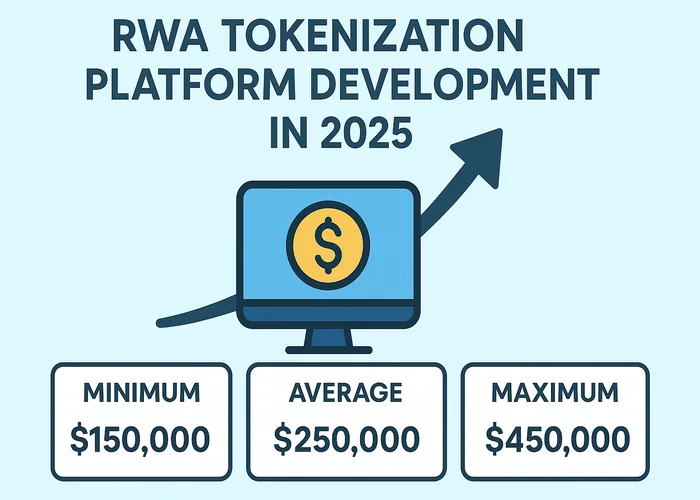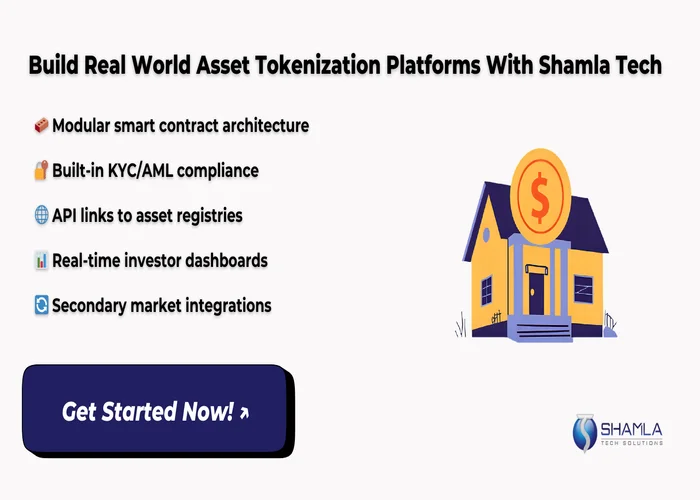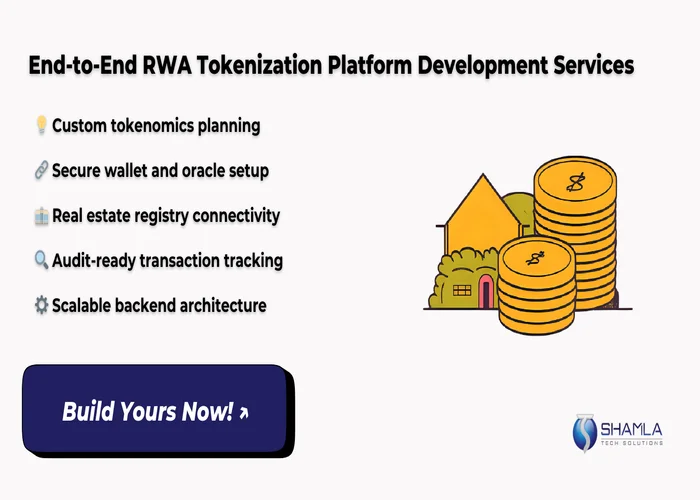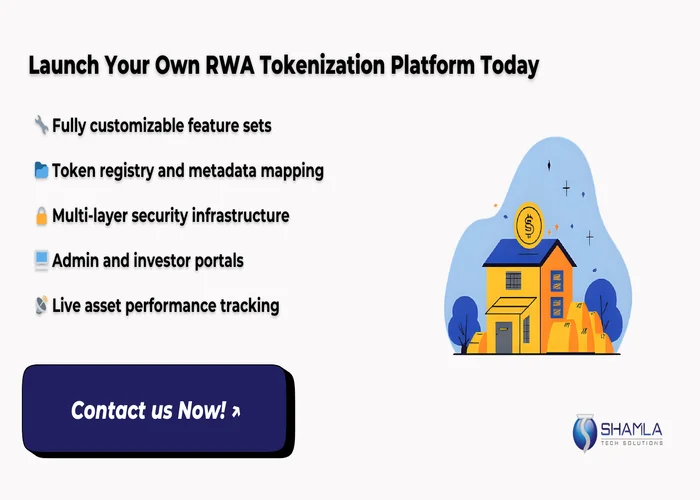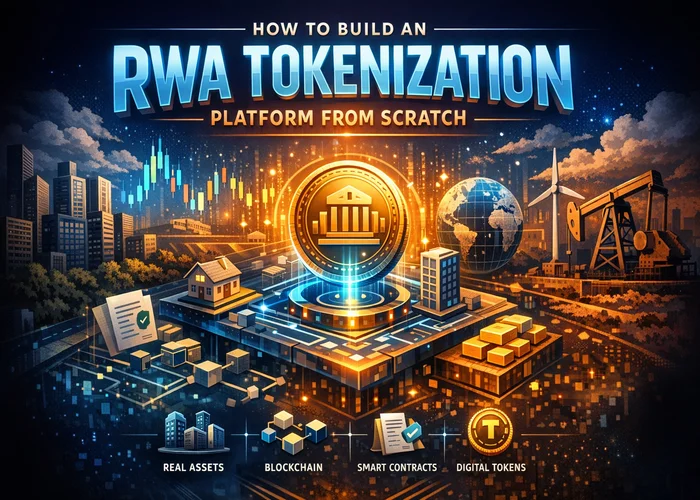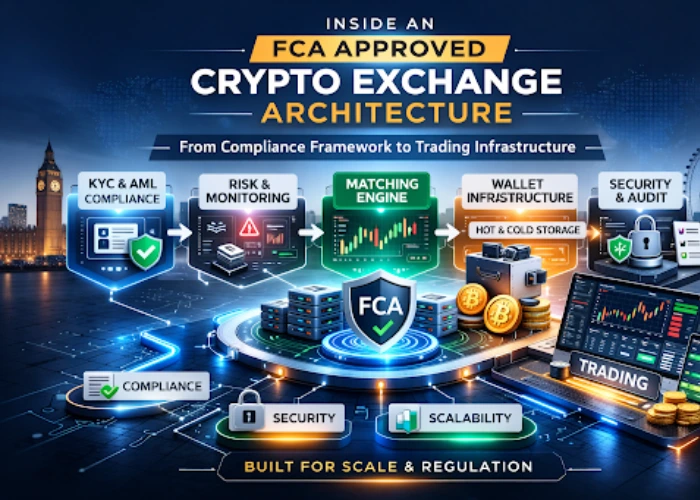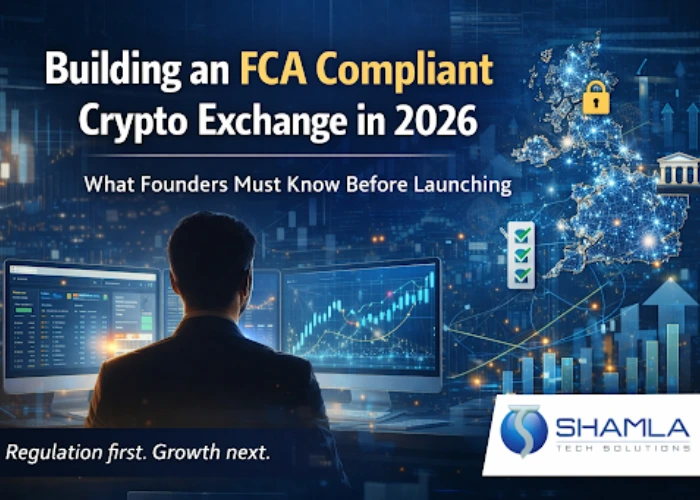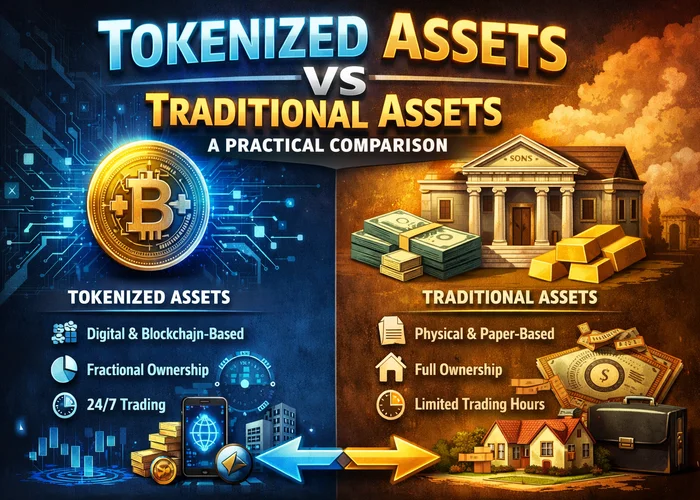Turning real‑world assets into tokens has grown quickly as investors look for ways to buy property, art, and goods on blockchain networks. The real cost of RWA tokenization platform development is 100k – 250k USD, covering features like digital wallet integration, legal compliance checks, and API connections with asset registries.
These platforms let organizations change physical assets into digital tokens that publicly trade on blockchain ledgers. They include parts for ID checks, smart contract templates, secure price feeds, and market interfaces. By changing real assets into tokens, companies improve cash flow, cut settlement times, and open investment chances to more people globally.
Understanding RWA Tokenization Platforms and 2025 Market Dynamics
2025 RWA Tokenization Market Dynamics
1. Key Cost Factors Driving Development
Development budgets hinge on integration depth and compliance scope. RWA tokenization platforms need secure wallet interfaces, reliable oracle feeds, and contract builders, each element adds to the real cost of RWA tokenization platform development. Teams must build user ID checks, audit trails, and legal modules to satisfy regulators. Extra APIs to link property registries or art provenance services raise setup time. Over‑engineering inflates maintenance work and cloud fees. Balancing feature sets against budget caps lets firms launch faster while keeping control over spend and avoiding surprise bills.
2. Enhancing Liquidity and Transparency
New features in RWA tokenization platforms improve trade flow and data clarity. By using public ledgers, RWA tokenization cuts settlement delays and shows every transaction openly. In RWA tokenization in real estate investment, tokens unlock tiny shares in buildings, letting small investors join large projects. Platforms that add on‑chain order books or peer‑to‑peer swaps cut middleman fees. Still, each upgrade factors into the real cost of RWA tokenization platform development, so teams must pick must‑have tools first to prove value before expanding.
3. Regulatory Clarity Reduces Barriers
Clear rules help teams launch faster. RWA tokenization platforms now embed rule‑check engines that scan each token issue against KYC and AML lists. Standard APIs show regulators exactly how token pools map to real assets. This setup proves real estate tokenization how it works while meeting local laws without custom builds. Embedding these checks cuts manual reviews and audit risks. With a solid rule layer, firms shift focus to user features and trading tools instead of legal firefighting.
4. Shaping Investment Access
By tokenizing assets on blockchains, platforms open new investor pools. RWA tokenization platforms let users buy tiny stakes in roads, warehouses, or art. In RWA tokenization in real estate investment, this means people worldwide can own slices of income‑producing property. As more firms launch token funds, real estate tokenization is the future of investments for many who lack big capital. Yet each new market module adds to the real cost of RWA tokenization platform development, so teams must phase roll‑outs from core trading to lending and staking.
5. Future Growth Projections
Analysts forecast that RWA tokenization platforms will handle trillions in real assets by 2027. As firms prove models, more banks and funds join, driving demand for secure token custody and reporting tools. When investors ask “real estate tokenization how it works,” platforms must answer with clear dashboards and simple workflows. User demand for fractional ownership will push teams to cut fees and speed up token minting. Given these drivers, real estate tokenization is the future of investments and RWA tokenization itself will shift from niche pilots to mainstream finance.
Breaking Down the Real Cost of RWA Tokenization Platform Development
1. Platform Core Architecture
Building the foundation drives the real cost of RWA tokenization platform development at roughly $20K – $40K. This phase covers:
- Designing ledger nodes and database schemas
- Wallet integration for token custody
- Basic smart contract templates
- API scaffolding for external services
By setting up reliable nodes and simple contract factories, this stage ensures smooth token minting. Every extra endpoint or custom data model raises the real cost of RWA tokenization platform development. Teams must balance node redundancy against budget to avoid outages without overspending. This core work also proves how real world asset tokenization gains structural strength in production environments.
2. Smart Contract Development
Writing and testing domain‑specific logic accounts for about $15K – $30K of total spend when teams code or buy pre‑built modules. The cost to create a RWA tokenization platform here includes:
- Token standard selection (ERC‑20, ERC‑721, ERC‑3643)
- Modular contract design for upgrades
- Unit tests and formal verification steps
Extra features like on‑chain royalty splits or multi‑sig controls drive up the real cost of RWA tokenization platform development. Developers should prioritize must‑have functions, then roll out advanced token flows in later sprints to align budget with platform goals.
3. Compliance and KYC Modules
Integrating identity checks and compliance rules takes $10K – $20K and drives another slice of the real cost of RWA tokenization platform development. Key tasks include:
- KYC/AML API connections
- Risk‑scoring engines
- Audit trails for regulator reviews
- Whitelisting logic for token issuance
Embedding off‑chain rule engines that flag suspicious wallets cuts manual reviews and speeds audits. By automating compliance, platforms support real world asset tokenization across jurisdictions without hiring large legal teams, keeping development cost‑efficient.
4. Integration with Asset Registries
Linking tokens to on‑chain records costs $15K – $25K. The cost to create a RWA tokenization platform at this stage covers:
- API connectors to land registries, art provenance services, or supply‑chain ledgers
- Data mapping layers for asset metadata
- Sync jobs for registry updates
- Error‑handling workflows
Every new registry link raises the real cost of RWA tokenization platform development. Teams can batch registry builds by asset class to reduce overhead and launch pilot pools before full roll‑out, proving that real world asset tokenization is valuable to stakeholders early.
5. Security and Audits
Allocating $15K – $30K here protects tokens and user funds, an essential driver of the real cost of RWA tokenization platform development. This stage involves:
- External smart contract audits
- Penetration testing on APIs and UI
- Secure key storage (HSMs or vaults)
- Continuous monitoring scripts
While heavy testing and high‑assurance storage add to budgets, they lower risk of hacks. By prioritizing code audits early, teams avoid expensive emergency fixes later. Security also underpins user trust, which is the core promise of real world asset tokenization.
6. UI/UX and Investor Dashboards
Designing clean, intuitive interfaces uses $10K – $20K. Partnering with real world asset tokenization development companies helps teams deliver:
- Fractional‑ownership dashboards
- Real‑time price charts
- One‑click token purchase flows
- Mobile‑responsive layouts
Working with specialized real world asset tokenization development companies ensures best practices and cuts trial‑and‑error. A streamlined UI drives adoption, demonstrating benefits of real estate tokenization directly to end users, while keeping the real cost of RWA tokenization platform development in check.
7. Ongoing Maintenance and Hosting
Budgeting $8K – $15K per year covers cloud fees, patching, and support—another facet of the real cost of RWA tokenization platform development. Teams should engage with real world asset tokenization development companies for real estate to handle:
- Server scaling and load balancing
- Routine dependency updates
- SLA‑backed incident response
- Data backups and disaster recovery
Maintaining uptime and compliance boosts the benefits of real estate tokenization by ensuring uninterrupted trading and reporting for investors.
8. Marketing, Analytics, and Regulatory Updates
Allocating $7K – $15K here closes the loop on the $100K – $250K total spend. Costs include:
- SEO‑optimized content explaining real estate tokenization is the future of investments
- Analytics dashboards to track user growth and trading volume
- Updates for new rules in each market
- Training materials for sales teams
By planning for ongoing rule changes and user insights, teams manage the real cost of RWA tokenization platform development effectively. Clear metrics and timely updates allow platforms to scale and prove the benefits of real estate tokenization to regulators and investors alike.
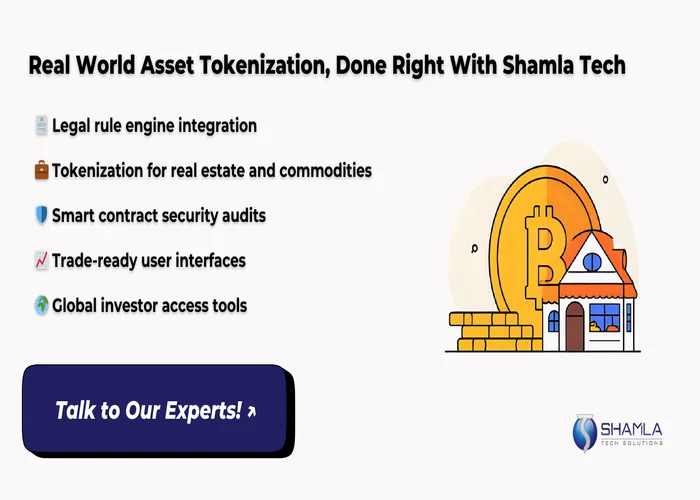
Why Shamla Tech is the Right Partner to Develop Your RWA Tokenization Platform
Why Shamla Tech Stands Out in RWA Tokenization:
1. Specialized Engineering Teams
Shamla Tech’s in-house experts tackle complex blockchain builds to control the real cost of RWA tokenization platform development. Our teams design modular smart contracts, build scalable node clusters, and integrate oracle feeds. As a top real world asset tokenization company, we draft clear specifications, run automated tests, and deliver audited code. By reusing proven libraries, we cut redundant work and limit unexpected bills. This focus lets us offer premium real world asset tokenization services that launch faster and cost less. Investors see lower fees and quicker rollouts, proving that real world asset tokenization done right minimizes build risk and maximizes uptime.
2. Modular Smart Contract Design
We offer tailored real world asset tokenization services that let clients pick needed features and avoid extra spend. Shamla Tech breaks down contracts into reusable modules like token issuance, transfer rules, and upgrade paths. This approach reduces the real cost of RWA tokenization platform development by isolating updates and simplifying audits. As a leading real world asset tokenization company, we deliver clear API specs and documentation. Clients can expand from basic tokens to complex rights splits without rewrites. This modularity accelerates proof of concept and pilots, demonstrating real world asset tokenization value before larger budgets get committed.
3. Automated Compliance Engine
Keeping up with KYC, AML, and local rules drives much of the real cost of RWA tokenization platform development. Shamla Tech embeds an off-chain rule engine that automates identity checks, risk scoring, and whitelist management. Our real world asset tokenization services connect to global data providers, flagging suspicious activity instantly. As a real world asset tokenization company, we maintain up-to-date rule sets and audit logs for regulators. This automation cuts manual review hours and speeds token issuance. Clients launch compliant platforms quickly, gaining market access while controlling hidden legal costs and proving real world asset tokenization can meet strict standards affordably.
4. Scalable Infrastructure and Hosting
Shamla Tech architects resilient cloud environments that adapt to trading peaks without driving up the real cost of RWA tokenization platform development. We configure auto-scaling nodes, load balancers, and parallel databases to handle growth. Our real world asset tokenization services include continuous monitoring, alerting, and zero-downtime deployments. As a top real world asset tokenization company, we optimize resource allocation to reduce idle costs. This ensures high availability for token trades and data queries.
5. Dedicated Support and Analytics
Shamla Tech’s real world asset tokenization platform model goes far beyond just the initial launch. We offer continuous support with 24/7 monitoring, swift incident resolution, and routine health assessments to ensure your platform runs securely and efficiently. Our dashboards track user activity, token volumes, and system metrics in real time. These analytics drive feature roadmaps and optimize the real cost of RWA tokenization platform development over time. As clients expand into property or art markets, we advise on scaling modules and integrating new asset classes. By guiding steps and sharing best practices, Shamla Tech proves that real estate tokenization is the future of investments and shows real estate tokenization how it works from first mint to global trading.
Conclusion
The real cost of RWA tokenization platform development falls in the $100K – $250K range that reflects architecture, contract logic, compliance modules, hosting scale, and security testing. Choose a partner with proven auditing, oracle links, and UI expertise. Conduct deep checks on past deployments, code quality, and regulatory handling to avoid budget overruns.
Shamla Tech is a leading RWA tokenization development company with global deployments across real estate, art, and commodities. Each platform features modular smart contracts, integrated KYC/AML, oracle‑linked price feeds, scalable nodes, secure key vaults, and analytics dashboards. We deliver proven uptime, low‑latency trades, and compliance‑ready reporting for enterprise and institutional investors worldwide.
Ready to launch your RWA tokenization platform?
Partner with Shamla Tech to build your own secure & scalable RWA Tokenization platform!

